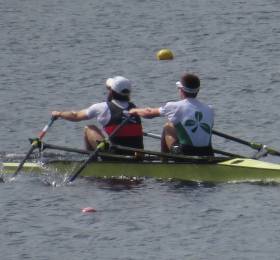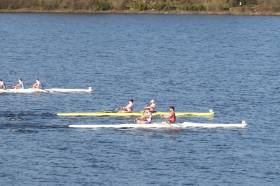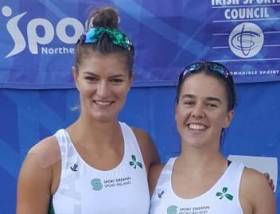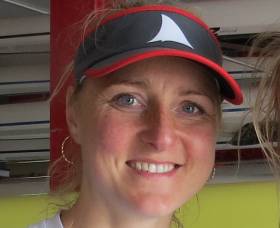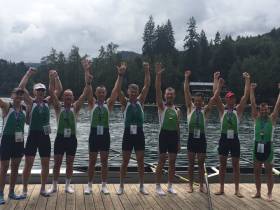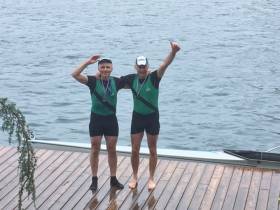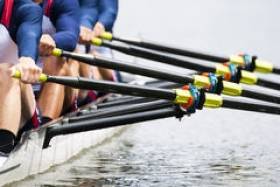Displaying items by tag: Crowley
Ireland Crews Weather Storm and Stay on Course
#Rowing: Paul O'Donovan and Fintan McCarthy hit the right mark in their first competitive race as the new Ireland lightweight double. At the World Cup Regatta in Rotterdam, they finished .39 seconds ahead of Australia in their time trial and qualified directly for the semi-finals.
The heats were run on a time trial basis as the regatta was buffeted by a storm and racing had to be delayed and the programme altered.
All six Ireland crews made it straight through in the changed system. The Ireland men's double of Philip Doyle and Ronan Byrne posted the best time in their heat, just ahead of Switzerland, who also qualified.
Aileen Crowley and Monika Dukarska also made it straight through. The Ireland pair finished second in their time trial to the outstanding New Zealand crew of Kerri Gowler and Grace Prendergast.
Jake McCarthy and Gary O'Donovan both qualified from their heats of the lightweight single sculls. McCarthy took second and O'Donovan third.
The one Irish crew which fell outside automatic qualification was the lightweight women's double of Lydia Heaphy and Denise Walsh. They finished fourth, but made it through as one of the fastest losers.
Boomer and Crowley Pip O'Driscoll and O'Donovan at Ireland Trial
#Rowing: The new crew of Patrick Boomer and Fionnan Crowley beat Shane O’Driscoll and Mark O’Donovan in their second race of the day at the Ireland trial at the National Rowing Centre. Boomer, from Belfast Boat Club, and Castleconnell’s Crowley had just half a second to spare over the Skibbereen men.
The second session was run in bright sunshine and on good water. Chris Kirwan of St Michael’s and Grace Healy of Commercial were the top junior double – though racing from unfancied lane six. The men’s junior double was won by Andrew Sheehan of Lee and Aaron Keogh of Three Castles.
Denise Walsh and Aoife Casey, who may be the Ireland lightweight double for the season, looked impressive, while the under-23 four of Eimear Lambe, Claire Feerick, Emily Hegarty and Tara Hanlon also had a good win.
Sunday’s racing has been cancelled, because of a forecast of bad weather.
Ireland Trial, National Rowing Centre
Men
Pair: M O’Donovan, S O’Driscoll. Under-23: S O’Connell, A Goff
Jun Pair: S Daly/M Campion
Single Sculls
Lightweight: P O’Donovan. U-23 Lwt: M Taylor. Under-23: N Hull. Jun: J Kearney
Women
Pair: A Keogh, M Dukarska. Under-23: C O’Brien, K Shirlow. Jun: C O’Sullivan, J Duggan.
Single: S Puspure. Lightweight: D Walsh. U-23 Lwt: K Dolan. Jun: M Curry.
Second Session
Men
Pair: Boomer, Crowley
Four, Under-23: Goff, O’Connell, O’Rourke, Nolan
Four – Jun: Hume, Reidy, Allen, Siltanen.
Double – Lwt/U23: Sutton, Taylor. Jun: A Sheehan, A Keogh
Single – P O’Donovan. Jun: A Christie.
Women
Four – Lambe, Feerick, Hegarty, Hanlon. Jun: O’Donoghue, Tyther, McInerney, Murphy
Double – Walsh, Casey. Jun: C Kirwan, G Healy
Single: Puspure. (Jun/U23 lwt): K Dolan (u23), E Loftus.
Crowley and Dukarska Miss Out at World Championships
#Rowing: Ireland’s Monika Dukarska and Aileen Crowley finished fifth in their repechage and missed out on the A/B semi-finals of the double sculls at the World Rowing Championships in Plovdiv, Bulgaria. The race featured a very close finish, with the Czech Republic overtaking the long-time leaders, Germany, on the line while Poland pulled out an outstanding sprint to take the crucial third place away from Chile. Ireland will go to the C/D semi-finals.
World Rowing Championships, Plovdiv, Bulgaria, Day Four (Irish interest)
Men
Lightweight Quadruple Sculls – Repechage One (First Two to A Final): 1 Turkey 5:51.12, 2 Ireland (F McCarthy, R Ballantine, J McCarthy, A Goff) 5:54.09
Women
Double Sculls – Repechage Three (First Three to A/B Semi-Finals): 1 Czech Republic 7:00.07, 2 Germany 7:00.30, 3 Poland 7:00.48; 5 Ireland (M Dukarska, A Crowley) 7:03.48
Crowley and Dukarska Win in Double in Italy
#Rowing: Ireland’s Monika Dukarska and Aileen Crowley took gold at the Memorial Paolo d’Aloja regatta in Piediluco in Italy this morning. The new double proved better than two Italian crews in a three-boat final. Sanita Puspure had to settle for silver in the women’s single, losing out to Diana Dymchenko of the Ukraine, while the women’s pair of Aifric Keogh and Emily Hegarty finished fifth in their six-boat final.
Memorial Paolo d’Aloja International Regatta, Piediluco, Italy (Irish interest)
Women
Pair – A Final: 5 Ireland (A Keogh, E Hegarty) 7:45.96.
Double Sculls – Final: 1 Ireland (M Dukarska, A Crowley) 7:13.93.
Single Sculls – A Final: 1 Ukraine (D Dymchenko) 7:38.04, 2 Ireland (S Puspure) 7:38.55, 3 Lithuania (M Valciukaite) 7:41.88.
Puspure Cruises Through to World Rowing Semi-Finals
#Rowing: Sanita Puspure won her repechage to qualify for the A/B Semi-Finals of the women’s single sculls at the World Rowing Championships in Sarasota-Bradenton today. The Ireland sculler was out on her own for virtually the entire 2,000 metres. She had three lengths over Lucie Zabova of the Czech Republic in the middle of the race and extended it to four by the finish. Both qualified.
In a major surprise Juan Dingli of China could only finish third in the second repechage and misses out on the chance of an A or B Final appearance.
The Ireland women’s pair of Aifric Keogh and Aileen Crowley finished fourth in their repechage, and will compete in the B Final. They were up with the leaders in the first 500 metres, but Britain and then Germany moved away from them and took the qualification places for the A Final. In the third quarter, China passed Ireland and held on to third despite a good finish by Crowley and Keogh.
World Rowing Championships, Sarasota-Bradenton, Florida – Day Four – Irish Interest:
Women
Pair – Repechage (First Two to A Final; rest to B Final): 1 Britain 7:25.99, 2 Germany 7:3.34; 4 Ireland (A Keogh, A Crowley) 7:41.13.
Single Sculls – Repechage (First Two to A Final; rest to B Final): 1 Ireland (S Puspure) 7:36.16, 2 Czech Republic (L Zabova) 7:45.98.
Crowley Hits the Mark Twice as Irish Amass Masters Wins
#Rowing: Irish crews continued to amass medals on the second day of the World Masters Regatta in Bled in Slovenia. The composite eight from Galway, Commercial, Clonmel, Neptune and Cork had a fine win in a good time of just over three minutes for the 1,000 metres. Denis Crowley won in both the E and C age groups in the single sculls and two composite fours won.
World Masters Regatta, Bled, Slovenia, Day Three (Selected Results; Irish interest; all heats of 1,000 metres, winners only)
Men
Eight ‘C’ (Avg age 43 or more) – Heat Nine: Galway, Commercial, Clonmel, Neptune, Cork (M McGlynn, R Forde, P Fowler, A McCallion, C Moloney, O McGrath, G O’Neill, B Smyth, B Crean) 3:00.35.
Four ‘D’ (Avg 50 or more): Commercial, Clonmel, Neptune (A Penkert, B Smyth, M Heavey, O McGrath, J Hudson) 3:23.86.
Four ‘E’ (Avg 55 or more) – Heat One: Commercial, Belfast BC (F O’Toole, C Hunter, C Dickson, D McGuinness) 3:20.25.
Sculling, Single - ‘E’ (55 or more)– Heat Three: Commercial (D Crowley) 3:49.40. C (43 or more) – Heat 23: Commercial (Crowley) 3:45.30
Irish Scullers, Pair and Four Win at World Masters
#Rowing: Two Irish scullers, a four and a pair led the Irish charge at the World Masters Regatta in Bled in Slovenia today. Denis Crowley of Commercial and Sean Heaney of Galway joined John Hudson and Gerry Murphy of Neptune as medal winners. The four of Rob Forde, Patrick Fowler, Oisin McGrath and Gary O’Neill also won – but after being adjudged late in the heat they had entered. They were moved into another heat, and came out on top there.
Three Irish eights just missed out, taking second place in their heats.
World Masters Regatta, Bled, Slovenia, Day Two (Selected Results; Irish interest; all heats of 1,000 metres, winners only)
Men
Four ‘C’ (avg age 43 or more) – Heat Five: Commercial, Clonmel, Neptune (R Forde, P Fowler, O McGrath, G O’Neill) 3:18.46.
Pair ‘E’ (avg 55 or more) – Heat Six: Neptune (J Hudson, G Murphy) 3:41.11.
Sculling, Single ‘D’ (50 or more) – Heat 11: Galway RC (S Heaney) 3:50.17. Heat 16: Commercial (D Crowley) 3:48.93.
Big Win for UCD's Crowley and Lambe At Rowing Championships
#Rowing: UCD’s Eimear Lambe and Aileen Crowley had an impressive win in the women’s senior pair in the deferred finals at the start of the third day of the Irish Championships at the National Rowing Centre. Skibbereen and Cork were in the touch with the UCD women until 1500 metres, but Lambe and Crowley left the rest behind from there and won by 10 seconds from Skibbereen.
Queen’s were also impressive in their win in the men’s novice eight, and Sanita Puspure won the senior single sculls with plenty to spare.
The junior 16 men’s eight went to Enniskillen, who thus completed the set of wins: the junior 18 and 16 eights for men and women.
Irish Rowing Championships, National Rowing Centre, Day Three (Selected Results)
Men
Eight – Novice: Queen’s 6:21.56.
Sculling, Quadruple – Junior: 1 Three Castles 6:21.53, 2 Shandon 6:22.75, 3 Clonmel 6:23.05.
Women
Pair – Senior: UCD (A Crowley, E Lambe) 7:37.41.
Sculling, Single – Senior: Old Collegians (S Pupsure) 8:02.64.
Ireland Crews Win at World Masters Rowing
#Rowing: Irish crews were amongst the winners again at the World Masters Regatta in Denmark today. Denis Crowley of Commercial and Niall O’Brien of Carlow won in the men’s single sculls for competitors 50 years or more and the Belfast Boat Club women’s coxed four (average age 60 or more) also won.
World Masters Regatta, Copenhagen (Irish interest - Winners; 1,000m)
Men
Single Sculls - D (average age 50 years or more) - Heat Two: Carlow Rowing Club (N O’Brien) 3:58.63. Heat 10: Commercial (D Crowley) 4:08.63.
Women
Four, coxed - F (average age 60 years or more) - Heat One: Belfast Boat Club 4:42.79.
Larsen Sets Good Time at Leinster Indoor Test
#Rowing: Breanna Larsen of Garda Boat Club set a fine personal best time of seven minutes 7.9 seconds at the Leinster Indoor Rowing competition at Garda Rowing Club on Saturday. Oblivious to the wind and rain outside, the women rowers from Garda, UCD and Trinity competed and set some good times. Trinity won the award for best female club, but Aileen Crowley of UCD took the under-23 title, clocking an impressive 7:13.30.
Leinster Indoor Competition, Garda Boat Club, Saturday (Selected Results, 2,000m unless stated) Full Results Attached
Men
Open: 1 D Kelly 6:17.8, 2 C McShane 6:54.8, 3 P Murphy 7:12.4. Novice (1,000): C Harrington 3:11.7. Jun 18: 1 N Beggan 6:51.8, 2 J Phelan 6:53.3, 3 A Lennon 6:56.0. Jun 16: R Quinn 6:54.9.
Masters 30+: D Quinn 6:31.40. Non-Rower (1,000m); 2:59.8.
Women
Open: 1 B Larsen 7:07.90 (PB), M Moore 7:20.10, 3 S O’Brien 7:23.6. Under-23: A Crowley 7:13.30. Junior 18: E Lambe 7:18.90, 2 C Feerick 7:29.6, 3 J Coleman 7:48.7. Jun 16: S Maxwell 7:49.6. Lightweight: G Crowe 7:33.90.
Novice (1,000m): B O’Brien 3:29.8.



























